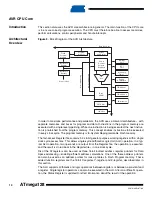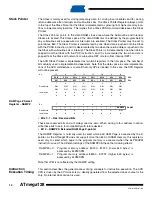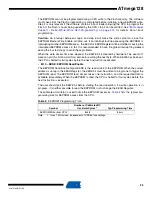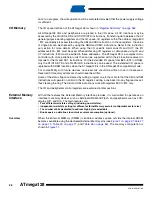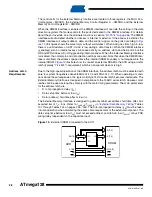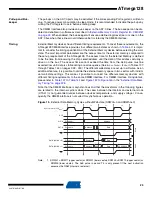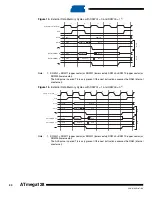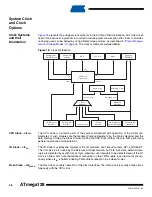
22
2467S–AVR–07/09
ATmega128
• Bits 11..0 – EEAR11..0: EEPROM Address
The EEPROM Address Registers – EEARH and EEARL – specify the EEPROM address in the
4K bytes EEPROM space. The EEPROM data bytes are addressed linearly between 0 and
4096. The initial value of EEAR is undefined. A proper value must be written before the
EEPROM may be accessed.
EEPROM Data
Register – EEDR
• Bits 7..0 – EEDR7.0: EEPROM Data
For the EEPROM write operation, the EEDR Register contains the data to be written to the
EEPROM in the address given by the EEAR Register. For the EEPROM read operation, the
EEDR contains the data read out from the EEPROM at the address given by EEAR.
EEPROM Control
Register – EECR
• Bits 7..4 – Res: Reserved Bits
These bits are reserved bits in the ATmega128 and will always read as zero.
• Bit 3 – EERIE: EEPROM Ready Interrupt Enable
Writing EERIE to one enables the EEPROM Ready Interrupt if the I-bit in SREG is set. Writing
EERIE to zero disables the interrupt. The EEPROM Ready interrupt generates a constant inter-
rupt when EEWE is cleared.
• Bit 2 – EEMWE: EEPROM Master Write Enable
The EEMWE bit determines whether setting EEWE to one causes the EEPROM to be written.
When EEMWE is written to one, writing EEWE to one within four clock cycles will write data to
the EEPROM at the selected address. If EEMWE is zero, writing EEWE to one will have no
effect. When EEMWE has been written to one by software, hardware clears the bit to zero after
four clock cycles. See the description of the EEWE bit for an EEPROM write procedure.
• Bit 1 – EEWE: EEPROM Write Enable
The EEPROM Write Enable Signal EEWE is the write strobe to the EEPROM. When address
and data are correctly set up, the EEWE bit must be set to write the value into the EEPROM.
The EEMWE bit must be set when the logical one is written to EEWE, otherwise no EEPROM
write takes place. The following procedure should be followed when writing the EEPROM (the
order of steps 3 and 4 is not essential):
1.
Wait until EEWE becomes zero.
2.
Wait until SPMEN in SPMCSR becomes zero.
3.
Write new EEPROM address to EEAR (optional).
4.
Write new EEPROM data to EEDR (optional).
5.
Write a logical one to the EEMWE bit while writing a zero to EEWE in EECR.
6.
Within four clock cycles after setting EEMWE, write a logical one to EEWE.
Bit
7
6
5
4
3
2
1
0
MSB
LSB
EEDR
Read/Write
R/W
R/W
R/W
R/W
R/W
R/W
R/W
R/W
Initial Value
0
0
0
0
0
0
0
0
Bit
7
6
5
4
3
2
1
0
–
–
–
–
EERIE
EEMWE
EEWE
EERE
EECR
Read/Write
R
R
R
R
R/W
R/W
R/W
R/W
Initial Value
0
0
0
0
0
0
X
0



